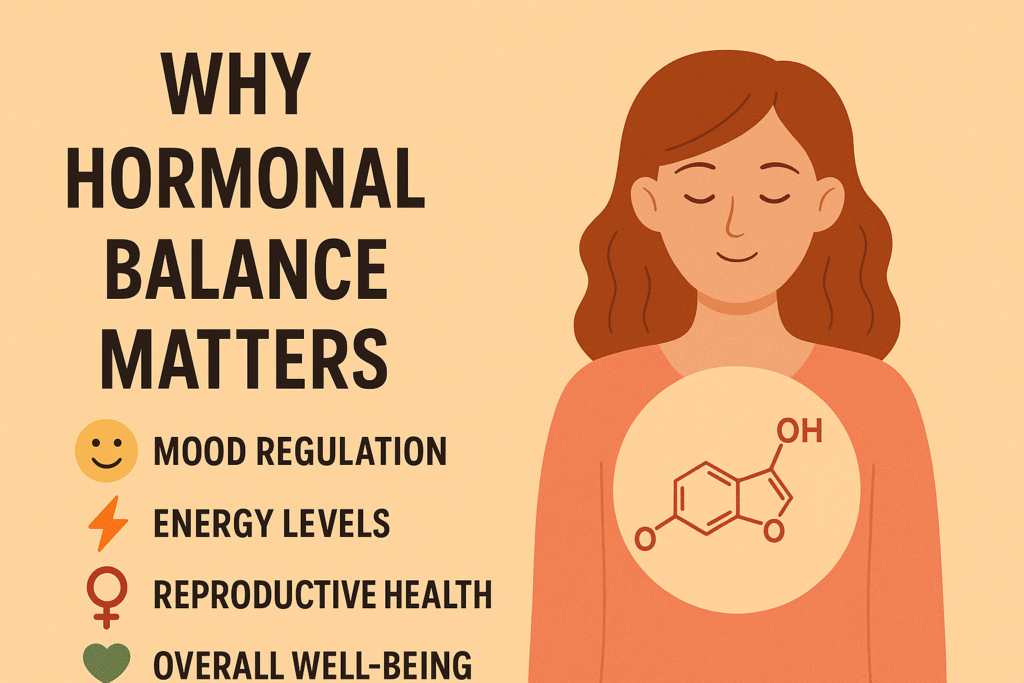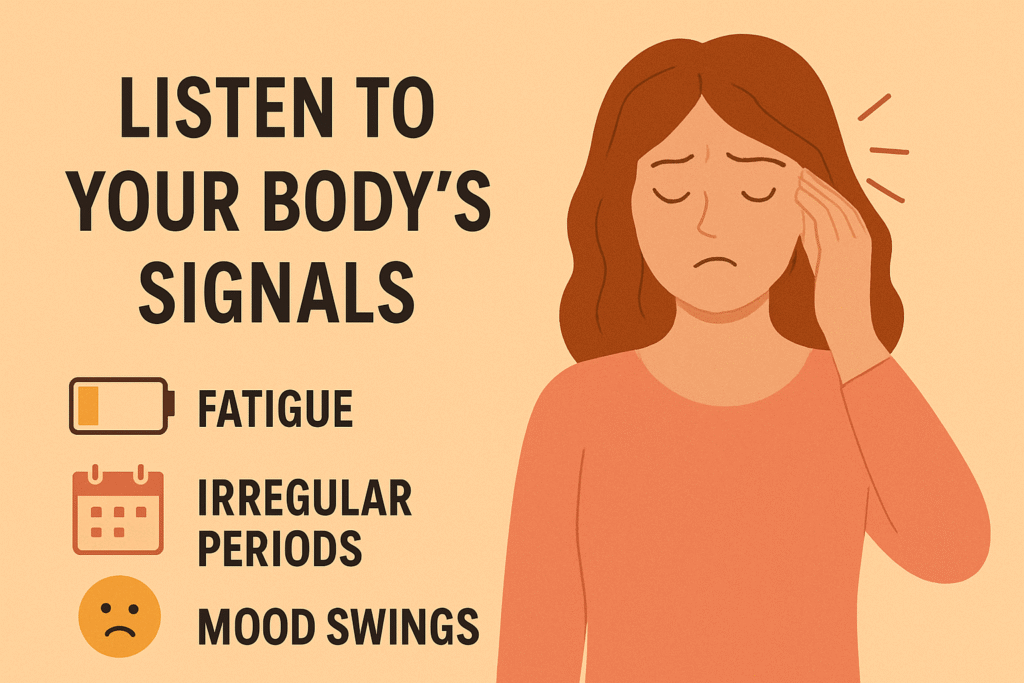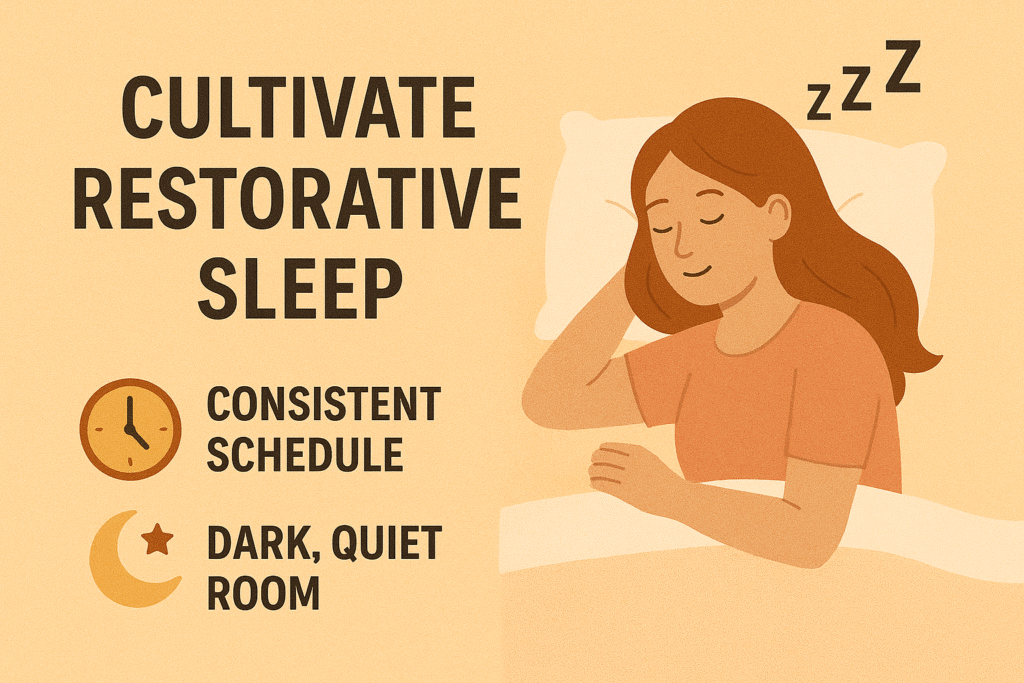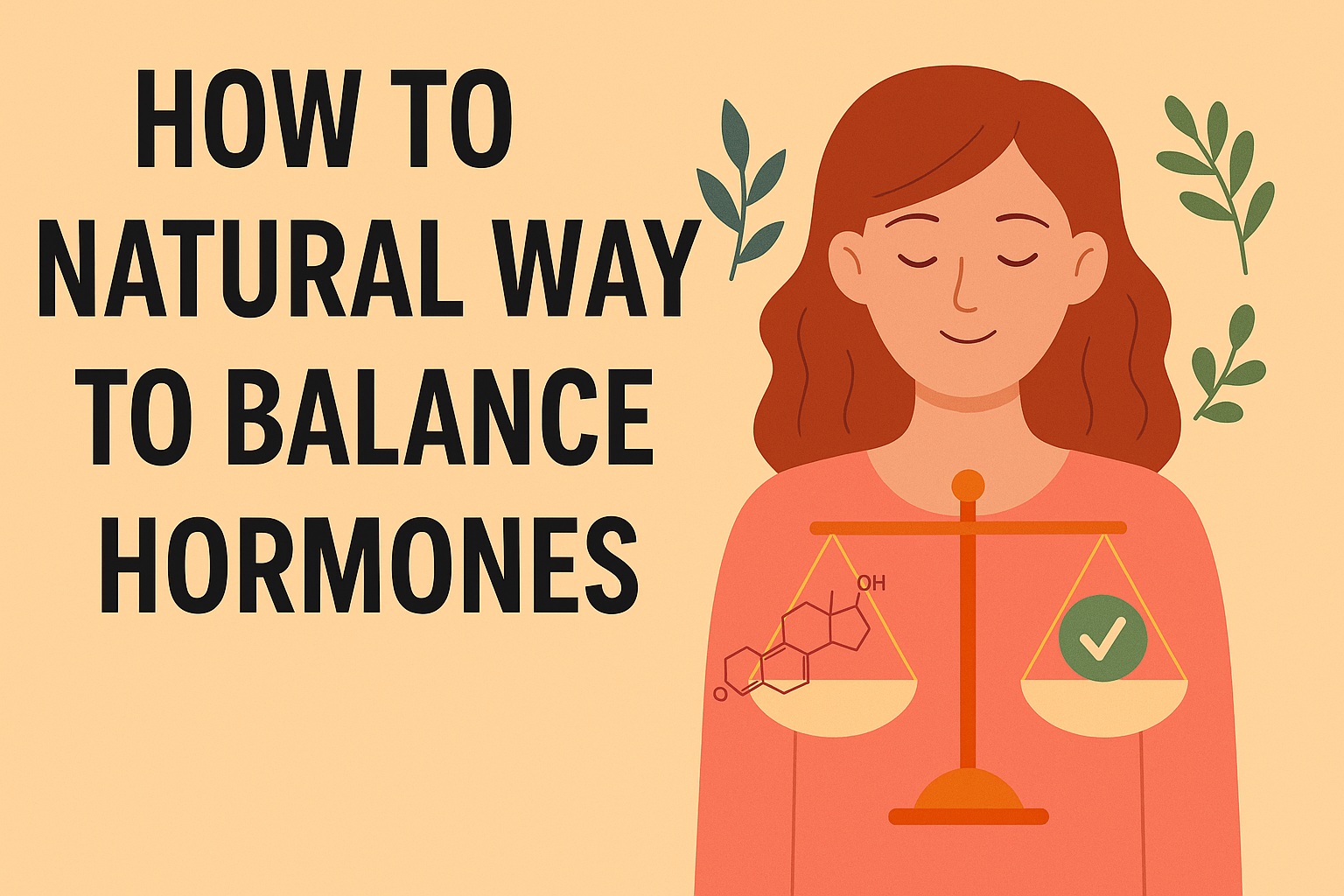Table of Contents
How to Natural Way to Balance Hormones: A Friendly, Practical Guide
Finding balance—whether at work, in relationships, or within our own bodies—can feel like chasing the horizon. When it comes to hormones, that internal balance has a profound impact on our energy, mood, sleep, digestion, weight, and even skin health. But here’s the good news: you don’t need prescription pills or invasive procedures to help your body restore harmony. By weaving a few everyday habits into your routine, you can support your endocrine system naturally and gently. Below, you’ll find an in‑depth, down‑to‑earth roadmap for how to natural way to balance hormones, complete with relatable stories, simple recipes, exercise ideas, and “real life” tips that actually work.
1. Why Hormonal Balance Matters

Think of hormones as tiny messengers zipping around your bloodstream, carrying instructions from one organ to another. They regulate everything from your stress response (cortisol) and sleep‑wake cycle (melatonin) to your metabolism (thyroid hormones) and reproductive health (estrogen, progesterone, testosterone). When just one of these messengers goes off script, you might notice:
- Energy dips and brain fog
- Mood swings or increased anxiety
- Stubborn weight gain or sugar cravings
- Trouble sleeping through the night
- Digestive upset or bloating
- Low libido or irregular cycles
Imagine running a play where your quarterback, receivers, and linemen aren’t on the same page. The game falls apart. Similarly, when hormones aren’t in sync, your body’s “playbook” misfires. Balancing them naturally means giving your system the right tools—food, movement, stress relief, sleep, and environmental tweaks—to rewrite that playbook and get every team member working together.
2. Listen to Your Body’s Signals

Before you jump into supplements or detox fads, tune into what your body is already whispering (or shouting) at you. A quick daily check‑in can reveal patterns:
- Morning energy level: Do you wake up energized, groggy, or anxious?
- Cravings: Are you reaching for sweets at 3 PM every day?
- Stress triggers: Do your shoulders tense the moment you open your laptop?
- Sleep quality: Are you falling asleep easily but waking up at odd hours?
- Digestion: Is bloating or constipation a regular visitor?
What to do: Keep a one‑sentence log each evening. Over two weeks, you’ll see connections. For example, you might realize that skipping breakfast leads to afternoon crashes, or that late‑night emails mean early‑morning anxiety. Once you spot the pattern, you can respond with a targeted tweak—like a protein‑rich smoothie for breakfast or a “no screens after 9 PM” rule.
3. Build a Hormone‑Supporting Plate
Food is by far the easiest and most enjoyable way to nourish your hormones. Focus on whole, minimally processed ingredients that supply:
- Healthy Fats
- Why: Cholesterol is the building block for steroid hormones (estrogen, progesterone, testosterone).
- Enjoy: Avocado toast with a drizzle of olive oil; handful of walnuts; a tablespoon of chia or flax seeds in your smoothie.
- Clean Protein
- Why: Amino acids are the raw materials for neurotransmitters and thyroid hormones.
- Enjoy: Pasture‑raised eggs; wild‑caught salmon or sardines; lentil‑quinoa salad.
- Colorful Veggies & Fiber
- Why: Fiber helps your body process and eliminate excess hormones; plant compounds (polyphenols) support detox pathways.
- Enjoy: A “rainbow stir‑fry” with bell peppers, broccoli, spinach, and carrots; mixed‑berry salad with pumpkin seeds.
- Low‑Glycemic Carbs
- Why: Stabilizing blood sugar maintains insulin balance, which in turn keeps cortisol in check.
- Enjoy: Sweet potatoes, steel‑cut oats, chickpeas, brown rice.
- Fermented Foods
- Why: Gut bacteria influence estrogen metabolism and appetite hormones like leptin and ghrelin.
- Enjoy: Sauerkraut, kefir, coconut yogurt, kimchi.
Sample “Hormone‑Happy” Breakfast:
- Overnight oats made with steel‑cut oats, almond milk, chia seeds, blueberries, and a dollop of plain Greek yogurt.
- Sprinkle with crushed walnuts and a dash of cinnamon.
4. Move in Ways That Feel Good

Exercise is medicine—when done right. Focus on balance:
- Strength Training (2×/week): Builds lean muscle and supports testosterone and growth hormone.
- Moderate Cardio (3×/week): Brisk walks, cycling, or swim sessions help regulate cortisol and insulin.
- Gentle Movement Daily: Yoga, Pilates, tai chi, or even a 10‑minute stretch break at your desk eases stress and boosts endorphins.
- Avoid Overtraining: Excessive high‑intensity workouts can spike cortisol and harm hormones, especially if you’re already stressed.
My Story: When I adopted a morning routine of 20 minutes of strength exercises (body‑weight squats, push‑ups, planks) and evening strolls after dinner, my energy stabilized. The midday slumps disappeared, and I wasn’t craving sugar at all.
5. Master Stress Management
Chronic stress throws cortisol into overdrive, which can suppress thyroid function, derail insulin, and deplete reproductive hormones. To calm the cascade:
- Breathing Breaks: Five deep, slow belly‑breaths can drop cortisol in minutes. Inhale for 4 counts, exhale for 6.
- Mini Meditation: Use a free app for a 3‑ to 5‑minute guided session—it’s easier than you think.
- Nature Time: Even a 10‑minute walk outside reduces stress hormones.
- Creative Outlets: Doodling, journaling, dancing—anything that shifts your mind away from “to‑do” lists.
- Set Boundaries: Schedule email‑free hours and protect them fiercely.
Tip: Carve out a “reset ritual” when you feel tension building—make a cup of green tea, stand by a window, do a quick stretch, or play one upbeat song and dance. This interrupts your stress loop and signals your body to relax.
6. Cultivate Restorative Sleep
Hormones like melatonin, cortisol, and growth hormone follow a daily rhythm locked to your sleep. To honor that:
- Stick to a Schedule: Aim for 7–8 hours, going to bed and waking at consistent times—even on weekends.
- Wind‑Down Hour: An hour before lights‑out, unplug from screens, dim the lights, and enjoy a calming ritual: herbal tea, gentle stretches, or reading a paperback.
- Optimize Your Space: Keep your bedroom cool (around 65–68°F), quiet, dark, and comfortable.
- Limit Caffeine & Alcohol: Both can interfere with deep REM sleep and hormone restoration.
Personal Win: When I committed to no devices after 9 PM and added a nightly cup of chamomile tea with a dash of cinnamon, I began falling asleep within 15 minutes instead of lying awake for nearly an hour.
7. Detox Your Environment, One Swap at a Time
Everyday chemicals—known as endocrine disruptors—can mimic or block your hormones. You don’t have to turn your home upside down overnight; swap one item every week:
- Plastic Water Bottles → Glass or Stainless Steel
- Non‑stick Cookware → Cast Iron or Ceramic
- Scented Candles & Air Fresheners → Beeswax Candles & Essential‑oil Diffuser
- Conventional Produce → Organic (focus on the “Dirty Dozen”: strawberries, spinach, apples, etc.)
- Fragrance‑filled Lotions/Soaps → Unscented, Natural‑ingredient Products
How I Did It: I kept a “swap list” on my fridge. Each time I ran out of something, I replaced it with the cleaner choice. This simple approach minimized decision fatigue and saved both time and money.
8. Use Supplements Wisely (Not Reliantly)
Supplements can fill nutritional gaps but shouldn’t replace solid habits. Always check with a healthcare provider before adding anything new. My go‑to support crew:
- Magnesium Glycinate (200–400 mg at night): Calms the nervous system and improves sleep quality.
- Ashwagandha (300 mg/day): An adaptogen that smooths stress peaks without causing drowsiness.
- Omega‑3 Fish Oil (1,000 mg EPA/DHA): Fights inflammation and supports brain health.
- Vitamin D3 + K2 (dosage based on blood test): Modulates immune function and hormone receptors.
- Probiotic Blend: Helps balance gut flora, which in turn influences estrogen metabolism and appetite control.
Pro Tip: Track how you feel—energy, mood, sleep—when you start a supplement, and reassess after six weeks. If you don’t notice improvement, consider pausing it and consulting a professional.
9. Tune In to Mini‑Victories
Lasting change happens through small wins. Each evening, jot down one positive shift:
- “I woke up once last night instead of three times.”
- “I didn’t crave chocolate after lunch.”
- “I felt calmer during that stressful Zoom meeting.”
Reading your “mini‑victories” at the end of the week fuels motivation and reminds you that progress is happening, even if slowly.
10. Know When to Seek Professional Guidance
While natural strategies benefit most, some situations call for expert care:
- Persistent, severe symptoms (e.g., drastic mood swings, unrelenting fatigue).
- Suspected thyroid disorders (hair loss, extreme cold intolerance).
- Polycystic Ovarian Syndrome (PCOS) or severe menstrual irregularities.
- Signs of adrenal dysfunction (hypoglycemia, salt cravings, chronic joint pain).
An integrative or functional medicine practitioner can run comprehensive hormone panels—saliva, blood, or urine—and tailor a plan combining lifestyle, supplements, and (if needed) bioidentical hormones.
11. Putting It All Together: A 6‑Week Reset Plan
| Week | Focus | Actions |
|---|---|---|
| 1 | Track & Tweak | Morning/journal check‑ins; swap your water bottle; add one veggie to each meal. |
| 2 | Move with Joy | Test three movement types; pick your favorite; schedule 3× this week. |
| 3 | Calm & Detox Evenings | Implement wind‑down routine; swap one household toxin source; note sleep quality. |
| 4 | Nourish Deeply | Build rainbow plate each meal; add healthy fats; include fermented food daily. |
| 5 | Smart Supplement Integration | Add magnesium at night and ashwagandha AM; track mood, sleep, energy. |
| 6 | Review & Personalize | Reflect on mini‑victories; adjust habits; consult a professional if needed. |
Wrapping Up: Your Natural Hormone Harmony Journey
Balancing your hormones isn’t about perfection; it’s about listening, adapting, and nurturing. By:
- Tuning into your body’s signals,
- Eating to nourish,
- Moving in ways that uplift,
- Managing stress with kindness,
- Sleeping deeply,
- Detoxing mindfully, and
- Using supplements as supportive tools—
you’ll create a ripple of well‑being that extends far beyond just hormone health. Celebrate each small step, learn from what doesn’t stick, and remember: this is your journey. Embrace it with curiosity and compassion, and before long, you’ll wake up feeling more balanced, energized, and in tune with your best self every single day.
You’ve got this. 🌿✨
READ MORE: How to Prevent Prostate Problems and Maintain Men Health
Seo tools blog: Zetways.com
